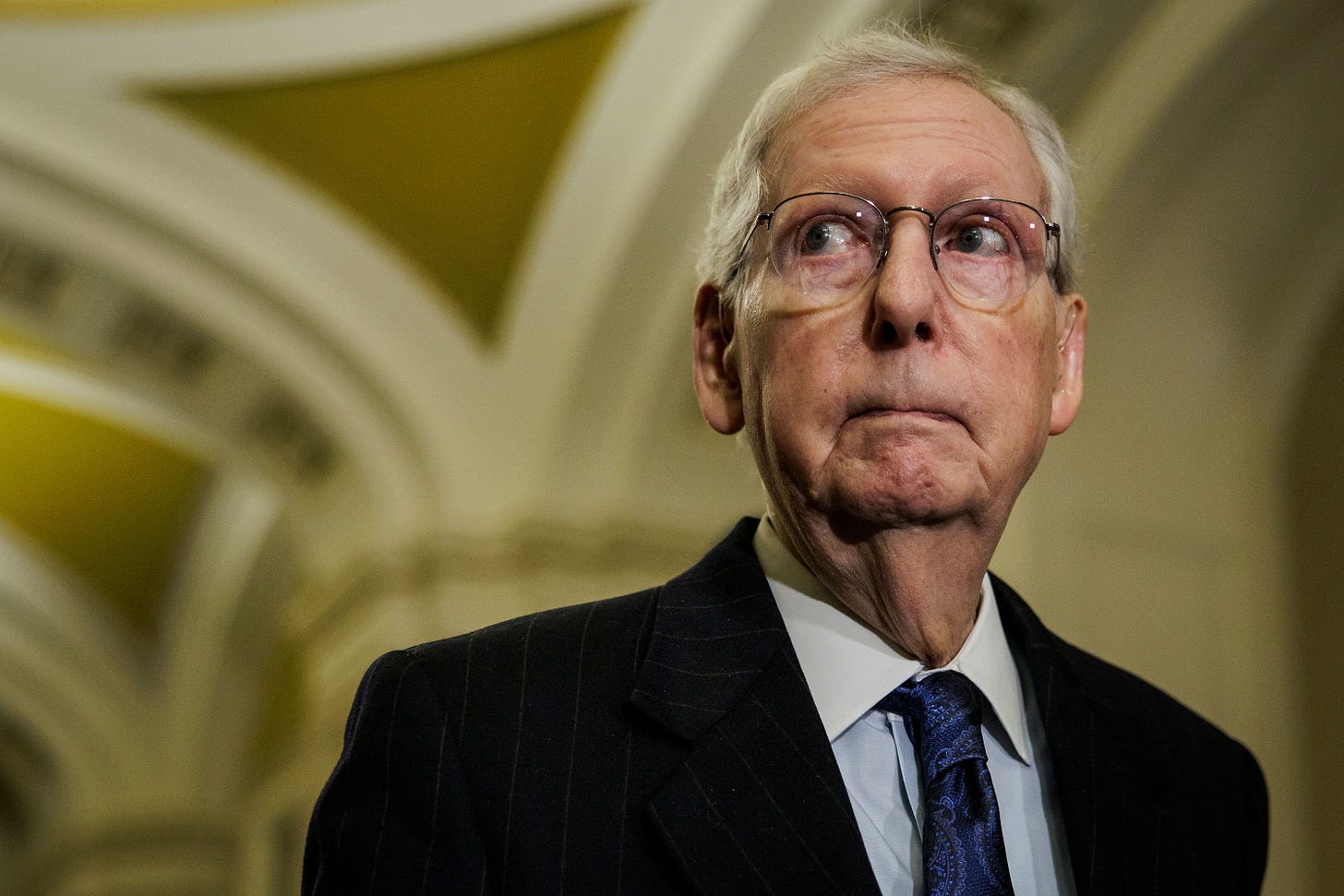I have been trying to wrap my head around the decision late last week by Kentucky Sen. Mitch McConnell to step aside as GOP leader.
It’s clearly the end of an era in Republican politics — and, honestly, politics more broadly.
But what, exactly does McConnell mean for politics? To help me better understand that, I reached out to my longtime friend Mark Preston.
Mark is now at CNN but I got to know him when he was covering the U.S. Senate at Roll Call newspaper in the early 2000s. No one understands McConnell better.
I reached out to Mark. We went back and forth over email about McConnell. I asked him if I could publish our exchanges and he agreed. It’s below! Enjoy!
Chris: Ok, so:
1) McConnell is perhaps the most impactful (and astute) Republican politician (other than presidents) in the last 40 years. His impact on campaign finance, the federal judiciary, the makeup of the GOP conference — it’s vast.
2) McConnell is going to be remember for two things he refused to do: He didn’t even meet with Merrick Garland when Obama nominated him for the Supreme Court and he voted against convicting Trump after January 6 — despite his stated belief that Trump was responsible for what happened.
Can both of those things co-exist? Like, can McConnell be the smartest politician Republicans have produced in decades AND the guy who helped give us Trump again?
Mark: Senator McConnell is one of the most puzzling, yet simplest political leaders I have witnessed in my career.
Puzzling, because he doesn’t fit into the mold of a typical politician: Often eager for attention and public admiration. McConnell shunned the spotlight, had an arms-length relationship with the media and was unflappable when approached for comment. If he didn’t want to speak, he wouldn’t say a word. If he did speak, it would be a few short sentences that carried a ton of weight.
McConnell seemed to find his happiness in the behind-the-scenes, cut-throat legislative chess game — which he mastered over the years in the Senate GOP leadership. Democrats will forever consider him an enemy of “democracy” for his role in McCain-Feingold and his willingness to marshal through a record number of conservative judges when he was in power.
Many Republicans, in this political environment, probably have no idea of McConnell’s influence in helping place conservative judges on the bench. Former President Donald Trump is credited with changing the political makeup of the US Supreme Court, but in reality it is the McConnell Court. Merrick Garland is President Biden’s Attorney General, not a member of the exclusive Nine – because of McConnell.
I describe him as simple, because McConnell was not a complex, complicated person to cover as a journalist. It was very rare to not have a good idea about McConnell’s end goal. And while he seems to have contradicted himself by not voting for Trump’s impeachment — McConnell is a “party man” and his party did not want to convict. He joined his party.
Unlike journalists, politicians aren’t angels.
Chris: HA! I think you make a really good point: Politicians are human too! They make mistakes. Say and do dumb things. (Hopefully) evolve over time.
I think one of the most important insights I ever had as a reporter covering politics was when I realized that. Like, these are just people. People with the same insecurities, worries and dreams as any of us. So, thanks for reminding me of that.
I am sort of fascinated by how McConnell will be remembered. I thought this quote — from McConnell — was telling in that regard: “Democrats hate me because of the court, and Republicans hate me because of Trump.”
Is that his legacy? A guy hated by both sides? Or is that just the recency bias here for a party totally captured by Trump?
Mark: The Senator is correct — Democrats will forever loathe him. And in the near term, MAGA Republicans will consider him a traitor to their movement because of President Trump.
But McConnell is no different than, say, the two US presidents and Florida governor who share the same last name … being on the wrong side of Trump has consequences. One of those consequences is being shunned by a portion of the same voters who once held you in high regard.
As for legacy, historians eventually get it right.
Chris: I think the fairest thing to say about McConnell was that he was consequential. He mattered. Whether it was the federal courts or campaign finance or recruiting and electing GOP Senators, the guy left a major mark.
Before we end though, I wanted to see if you had a good story about covering McConnell that you’d share?
Mark: When my daughter was born, his office gave me two letters: One addressed to my wife and myself and the other to my daughter congratulating us. I was back at work — four days after she was born and I remember the Senator come up behind me and ask if I was getting sleep. Even though he has had an arms-length relationship with the media — he is a gentlemen.





Is it ok to hate McConnell for the courts AND for (giving us) Trump? I certainly do. He had a chance to bury Trump after J6 but proved to be a coward. I wonder if he regrets that decision now.
He is/was absolutely a consequential politician. And, to be sure, being “consequential” can also be a bad thing. In his case, I would submit that his career will be defined by two things: The overturning of Roe v. Wade, and his “no” vote on impeachment. Had he voted “yes”, other Republican Senators would have followed and the menace of Donald Trump would have been ended in early 2021.